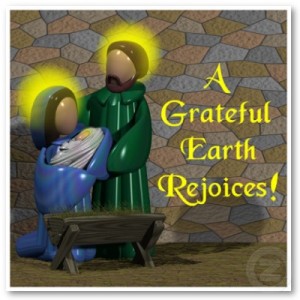
Joy To The Cosmos, The Lord Has Come…
Jesus said to them, “Go into all the world and preach the good news to all creation” (Mark 16:15). The Greek word for “creation” is cosmos. The Gospel (good news) is for all creation. Believers are called to be ambassadors, witnesses, first fruits of this good news. Creation is to benefit. Creation is to be blessed.
The extraordinary good news an angel announced to shepherds on Bethlehem hillsides 2000 years ago was, “Do not be afraid, for I bring you good news of great joy that will be for all the people. Today in the town of David the Savior has been born to you, he is Christ the Lord” (Luke 2:10,11).
Several centuries ago the renowned hymnist Isaac Watts penned one of the great Christmas songs of all time, “Joy to the World.” The words resound with good news to all creation. Comments in italics…
Verse 1 (nature rejoices that Jesus the Lord is come to be its king)
Joy to the world! the Lord is come;
Let earth receive her King;
Let every heart prepare him room,
And heaven and nature sing,
And heaven and nature sing,
And heaven, and heaven, and nature sing.
Verse 2 (when when we humans accept the reign of the Savior, the very land is able to be in the condition and purpose that God has created for them. This is their joy, so to speak)
Joy to the Earth! the Saviour reigns;
Let men their songs employ;
While fields and floods, rocks, hills, and plains
Repeat the sounding joy,
Repeat the sounding joy,
Repeat, repeat the sounding joy.
Verse 3 (this refers to the curse of rebellion against God, exemplified by Adam’s sin, which alters creation’s blessings)
No more let sins and sorrows grow,
Nor thorns infest the ground;
He comes to make His blessings flow
Far as the curse is found,
Far as the curse is found,
Far as, far as, the curse is found.
Verse 4 (Jesus is the measure and marker of how we humans and our nations are to rule. Alas! How far short humans fall.
He rules the world with truth and grace,
And makes the nations prove
The glories of His righteousness,
And wonders of His love,
And wonders of His love,
And wonders, wonders, of His love.
Let us enter 2010 with renewed commitment that our deeds and lives will indeed be witnesses and advocates of Jesus’ Good News of Great Joy to our neighbors, to our communities, even to our enemies, and to all creation.
–Allen Johnson
Go, tell it on the mountain,
Over the hills and everywhere
Go, tell it on the mountain,
That Jesus Christ is born.
Go Tell It on the Mountain” is an African-American spiritual compose in the mid-19th Century that is often sung as a Christmas carol. The Gospel of Luke, chapter 2, records an angel announcing to shepherds out at night with their flocks, “Fear not, for behold, I bring you good news of great joy that will be for all the people. 11 For unto you is born this day in the city of David a Savior, who is Christ the Lord.” After the shepherds witness the newborn Jesus, “they made known what had been told them about this child.”
Bethlehem, where Jesus was born, lies in the Judean hill country, part of a broad-shouldered north-south mountain spine lying between the Mediterranean Sea to the west and the sub-sea level Dead Sea to the east. The inhabitants were adapted to this rugged hill terrain. Jesus later on grew up further north on that mountain range, in Nazareth in the province of Galilee.
The aristocratic priests and elite urbanites of Jesus’ day looked down their noses at Galileans. For one thing, Galileans had an accent that included a slurring of their words to such an extent that words were often misunderstood. The Temple priests accused Galileans of being lax in their tithes and religious observances. The priests did not believe Galileans had good character or intelligence. Since Galileans were poor agricultural people, and in disfavor by the urbanites, they came to be derisively catcalled, am ha-retz, “people of the land.” Or in modern vernacular, “hillbillies.” Jesus was a hillbilly.
Shepherds in the time of Jesus were looked down upon as unreliable, uncouth, thieving, and rowdy. Their testimony was not allowed in court. Yet it was to shepherds that the angel announced the birth of the Savior.
Modern elites today tend to look down on mountain people living in the heart of Appalachia in a way that is analogous to Galileans and shepherds of Jesus’ time. And it seems easier on the conscience to defraud and exploit mountain people once they’ve been downgraded. A desecration such as mountaintop removal would never happen in the Poconos or Catskills that are playgrounds for the rich and mighty.
A few months before Jesus’ birth, Mary his mother prophesied about this birth.” He has shown might in his arm: he has scattered the proud in the conceit of their heart. He has brought down the powerful from their seats, and has exalted the humble. He has filled the hungry with good things; and the rich he has sent empty away” (Luke 1:51-53).
Jesus’ identification with the lowly of the world, those looked down upon by the self-sufficient and proud, is not part of today’s slick and tidy Christmas story. Yet this is a vital part of the Christmas message. So…go tell it on the mountain!
—Allen Johnson
